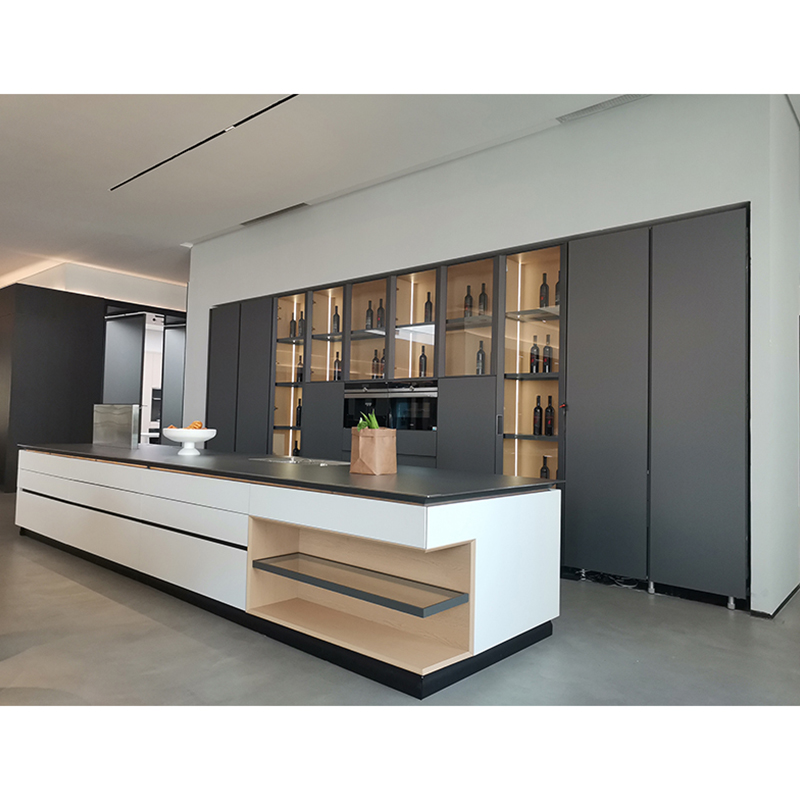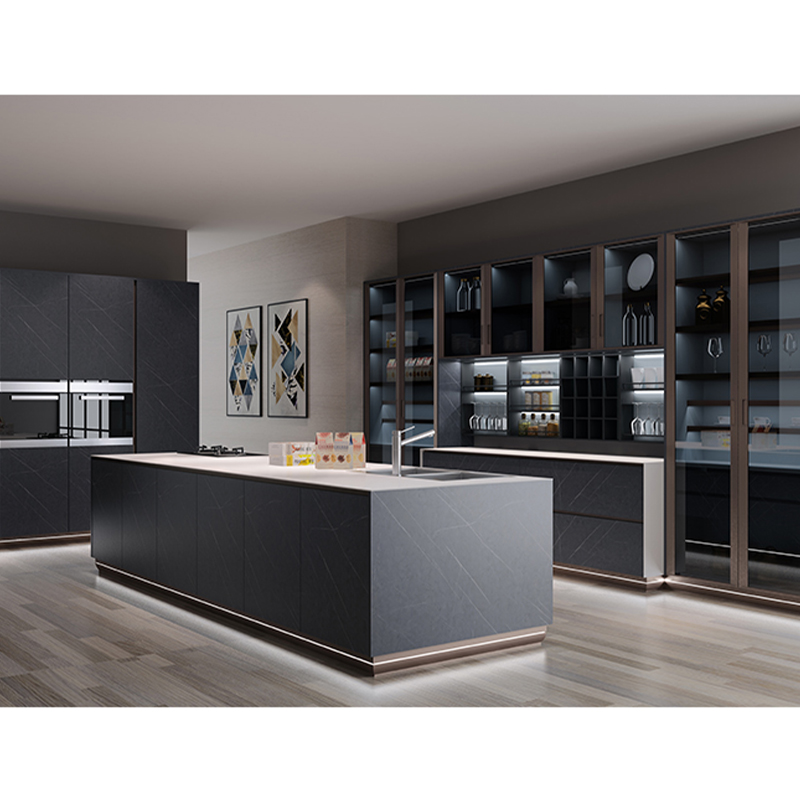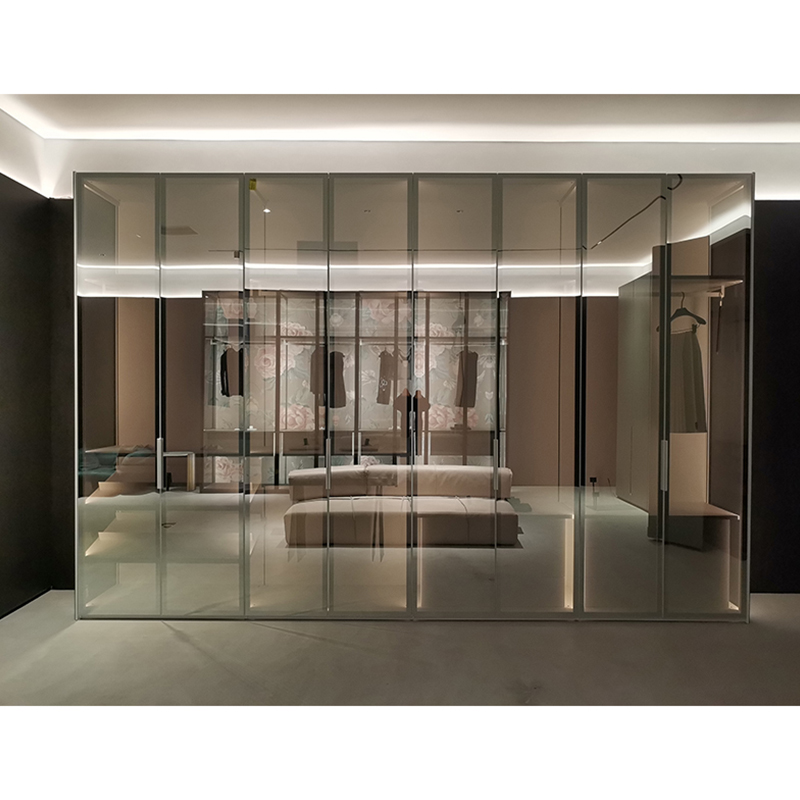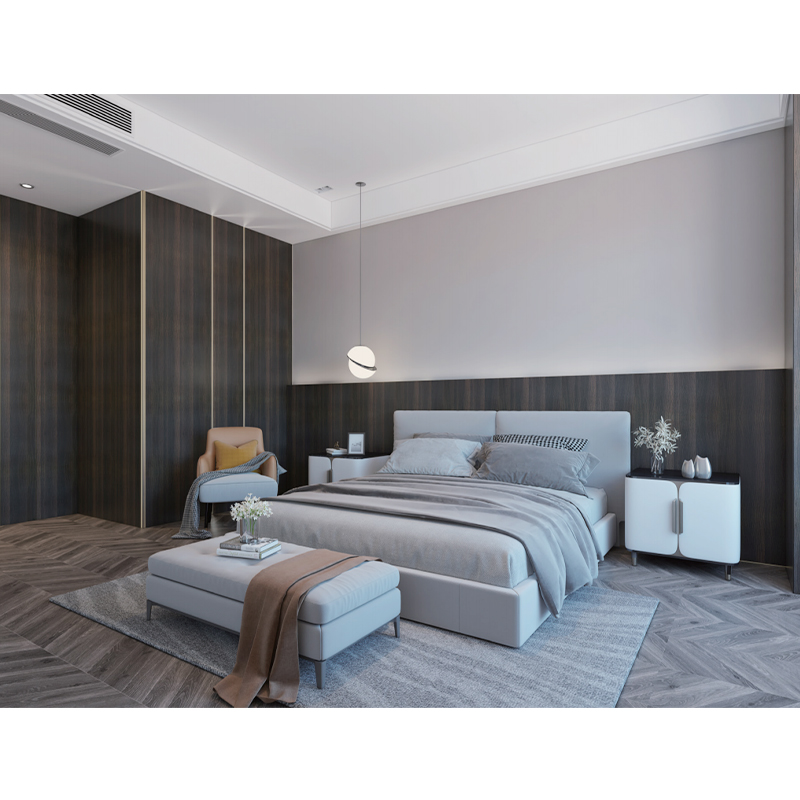How can aluminum frame glass door kitchen cabinets enhance the sense of space and lighting in small kitchens through transparent design?
Release Time : 2025-10-17
In modern urban living environments, kitchen space is often limited, especially in smaller homes, where kitchens often face cramped, oppressive spaces, and insufficient lighting. While traditional solid-door cabinets offer excellent storage functions, they can visually exacerbate the feeling of enclosure and make the space appear even narrower. The emergence of aluminum frame glass door kitchen cabinets offers an elegant and effective solution to this dilemma. Through their transparent design, they cleverly break down physical boundaries, visually extending the space and improving lighting, giving small kitchens a spacious and bright atmosphere.
The core advantage of aluminum frame glass doors lies in their visibility. Unlike completely enclosed cabinet doors, glass allows for a clear view through the cabinet, unobstructing the interior space. When neatly arranged with tableware, cups, or decorative utensils, these items become part of the interior decor, creating a "display that enhances" effect. This design not only adds a sense of depth to the space but also reduces visual barriers, giving the kitchen a lighter and more airy feel. Especially when wall cabinets feature glass doors, the previously oppressive upper space is "opened up," allowing for unimpeded sightlines and enhancing the sense of height.
Glass doors offer a natural advantage in terms of lighting. Whether it's natural light pouring in from windows or artificial lighting from ceiling lights or downlights, light passes through the glass doors, refracting and reflecting repeatedly inside and outside the cabinets, creating a soft, diffused effect. This flow of light eliminates the shadows and dead spots caused by traditional cabinetry, ensuring a more even distribution of brightness throughout the kitchen. Even corners without direct light appear bright and clear due to the glass's reflective properties. This ability to "borrow light" is particularly important in small kitchens lacking exterior windows or with poor lighting, effectively alleviating the feeling of dimness and creating a refreshing, bright cooking environment.
The aluminum frame structure bridges the gap between transparency and stability. The slender aluminum alloy frame outlines the glass with minimalist lines, ensuring the overall strength of the door panel while minimizing visual impact. Compared to heavy wooden frames, metal frames are lighter, seemingly "floating" the glass within the cabinet, further enhancing the sense of lightness. The meticulously processed aluminum surface is smooth and flat, corrosion-resistant and resistant to deformation, maintaining its crisp, stylish appearance over long periods of use and ensuring smooth opening and closing of the glass door with a secure seal.
Furthermore, the design flexibility of aluminum-framed glass doors allows for personalized small kitchens. The glass can be chosen in a variety of textures, including clear, frosted, rainbow, and sandblasted, meeting display needs while also ensuring privacy and stain resistance. With built-in LED light strips, when the cabinet doors are opened at night, the light illuminates the utensils from the inside out, providing convenient access and creating a warm and elegant atmosphere, making the kitchen a focal point even during off-peak hours.
More importantly, this transparent design encourages tidy interiors. With a clear view of the cabinet contents, users are more proactive in organizing and arranging them, creating a virtuous cycle. With strategically arranged layers and storage, the glass cabinet serves not only as a display surface but also as efficient storage space, achieving a perfect balance of beauty and practicality.
Ultimately, the value of the aluminum frame glass door kitchen cabinet lies not in its materials but in the experience it transforms. Using a single piece of glass and a metal frame, it dissolves the confines of a small space, allowing light to flow freely and extending the view. In every ray of light and shadow, in every burst of brightness between openings and closings, it redefines the possibilities of a small kitchen—proving that even with limited space, living can still be transparent and bright. This profound understanding of spatial aesthetics embodies the wisdom of modern home design.
The core advantage of aluminum frame glass doors lies in their visibility. Unlike completely enclosed cabinet doors, glass allows for a clear view through the cabinet, unobstructing the interior space. When neatly arranged with tableware, cups, or decorative utensils, these items become part of the interior decor, creating a "display that enhances" effect. This design not only adds a sense of depth to the space but also reduces visual barriers, giving the kitchen a lighter and more airy feel. Especially when wall cabinets feature glass doors, the previously oppressive upper space is "opened up," allowing for unimpeded sightlines and enhancing the sense of height.
Glass doors offer a natural advantage in terms of lighting. Whether it's natural light pouring in from windows or artificial lighting from ceiling lights or downlights, light passes through the glass doors, refracting and reflecting repeatedly inside and outside the cabinets, creating a soft, diffused effect. This flow of light eliminates the shadows and dead spots caused by traditional cabinetry, ensuring a more even distribution of brightness throughout the kitchen. Even corners without direct light appear bright and clear due to the glass's reflective properties. This ability to "borrow light" is particularly important in small kitchens lacking exterior windows or with poor lighting, effectively alleviating the feeling of dimness and creating a refreshing, bright cooking environment.
The aluminum frame structure bridges the gap between transparency and stability. The slender aluminum alloy frame outlines the glass with minimalist lines, ensuring the overall strength of the door panel while minimizing visual impact. Compared to heavy wooden frames, metal frames are lighter, seemingly "floating" the glass within the cabinet, further enhancing the sense of lightness. The meticulously processed aluminum surface is smooth and flat, corrosion-resistant and resistant to deformation, maintaining its crisp, stylish appearance over long periods of use and ensuring smooth opening and closing of the glass door with a secure seal.
Furthermore, the design flexibility of aluminum-framed glass doors allows for personalized small kitchens. The glass can be chosen in a variety of textures, including clear, frosted, rainbow, and sandblasted, meeting display needs while also ensuring privacy and stain resistance. With built-in LED light strips, when the cabinet doors are opened at night, the light illuminates the utensils from the inside out, providing convenient access and creating a warm and elegant atmosphere, making the kitchen a focal point even during off-peak hours.
More importantly, this transparent design encourages tidy interiors. With a clear view of the cabinet contents, users are more proactive in organizing and arranging them, creating a virtuous cycle. With strategically arranged layers and storage, the glass cabinet serves not only as a display surface but also as efficient storage space, achieving a perfect balance of beauty and practicality.
Ultimately, the value of the aluminum frame glass door kitchen cabinet lies not in its materials but in the experience it transforms. Using a single piece of glass and a metal frame, it dissolves the confines of a small space, allowing light to flow freely and extending the view. In every ray of light and shadow, in every burst of brightness between openings and closings, it redefines the possibilities of a small kitchen—proving that even with limited space, living can still be transparent and bright. This profound understanding of spatial aesthetics embodies the wisdom of modern home design.







